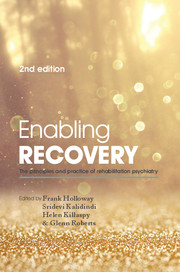Book contents
- Frontmatter
- Contents
- List of contributors
- List of figures, tables and boxes
- Preface
- Part 1 Setting the scene
- Part 2 Treatment approaches
- Part 3 Key elements of a rehabilitation service
- Part 4 Special topics in psychiatric rehabilitation
- 23 Special topics in psychiatric rehabilitation: overview
- 24 Rehabilitation and acquired brain injury
- 25 Autism spectrum disorder
- 26 Risk management in rehabilitation practice
- 27 Rehabilitation: an international perspective
- 28 Psychosocial rehabilitation across culture: the experience in low- and middle-income countries
- 29 Expanding the evidence base
- Part 5 Future directions
- Index
23 - Special topics in psychiatric rehabilitation: overview
from Part 4 - Special topics in psychiatric rehabilitation
Published online by Cambridge University Press: 02 January 2018
- Frontmatter
- Contents
- List of contributors
- List of figures, tables and boxes
- Preface
- Part 1 Setting the scene
- Part 2 Treatment approaches
- Part 3 Key elements of a rehabilitation service
- Part 4 Special topics in psychiatric rehabilitation
- 23 Special topics in psychiatric rehabilitation: overview
- 24 Rehabilitation and acquired brain injury
- 25 Autism spectrum disorder
- 26 Risk management in rehabilitation practice
- 27 Rehabilitation: an international perspective
- 28 Psychosocial rehabilitation across culture: the experience in low- and middle-income countries
- 29 Expanding the evidence base
- Part 5 Future directions
- Index
Summary
Up to this point this book has provided a review of the concepts surrounding rehabilitation and recovery in mental health services (in Part 1, ‘Setting the scene’), described a range of therapeutic approaches that are important in rehabilitation practice (in Part 2, ‘Treatment approaches’) and set out the core components of an effective and comprehensive rehabilitation service (in Part 3, ‘Key elements of a rehabilitation service’).
All the contributors to Parts 1, 2 and 3 work in the UK, the majority as practitioners working in the National Health Service (NHS) or in academic positions. It is likely that any further edition of this or a future book with similar aspirations would include significantly more contributions from people working in independent and voluntary sector organisations and people with lived experience of severe mental illness.
Rightly, the focus of the book has been on people living with a diagnosis of major mental disorder – schizophrenia, schizoaffective disorder and bipolar disorder – since these diagnoses are by far the commonest among people in contact with specialist psychiatric rehabilitation services. However, an increasing minority of service users have other diagnoses, either as the primary problem or as a comorbidity. Chapter 12, ‘Working with coexisting substance misuse’, is new to this edition. Substance misuse is a common problem for rehabilitation services and their client group, and the topic's omission from the first edition has been rectified. Chapter 11, ‘Working with challenging behaviour’, draws on clinical experience of work in secure settings with people with borderline personality disorder.
Editors inevitably have to make decisions about what goes into a book but equally determine what is left out, either deliberately or by default. Our first edition included a brief chapter on the social context of mental illness, which discussed social factors implicated in the causation of schizophrenia, notably the experience of migration, and the social consequences of severe mental illness, including stigma and impaired self-image. Subsequent research has focused on other forms of psychosocial stress as possible causative factors for psychosis (Morgan et al, 2008; van Winkel et al, 2008), with, as noted in Chapter 5, ‘Understanding madness’, great interest in childhood trauma as a risk factor for schizophrenia in later life (Bebbington et al, 2011).
- Type
- Chapter
- Information
- Enabling Recovery , pp. 353 - 358Publisher: Royal College of PsychiatristsPrint publication year: 2015



